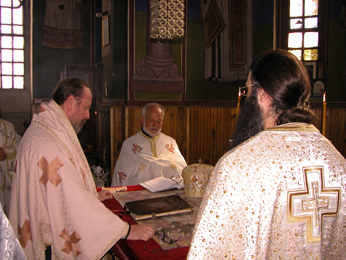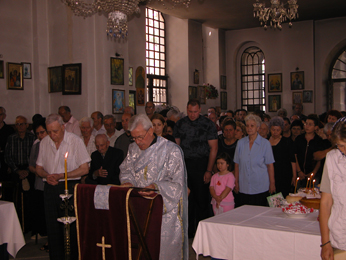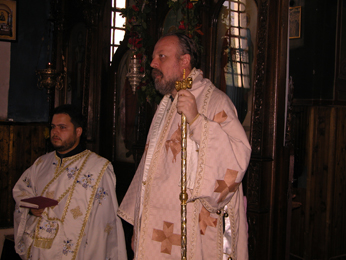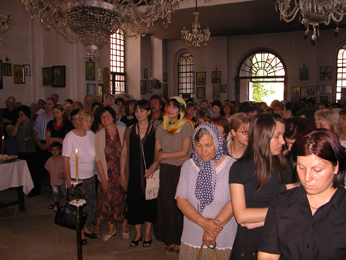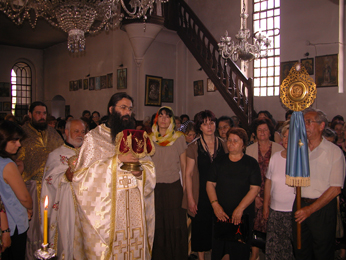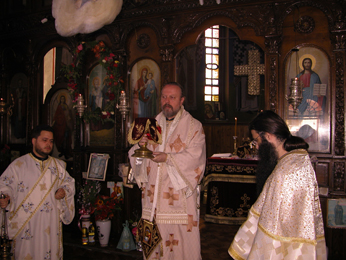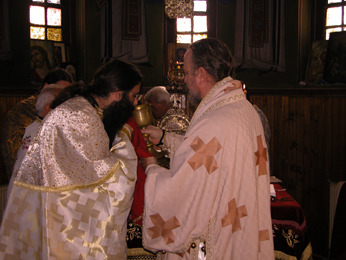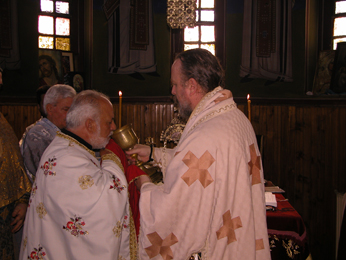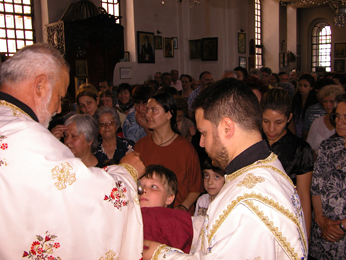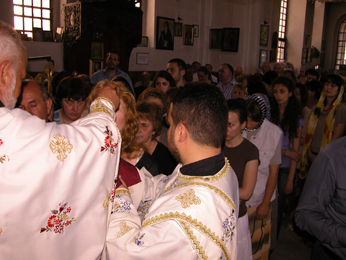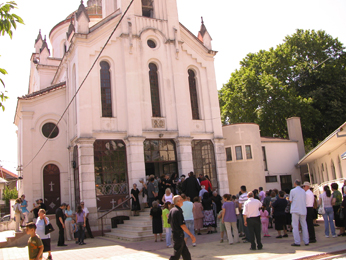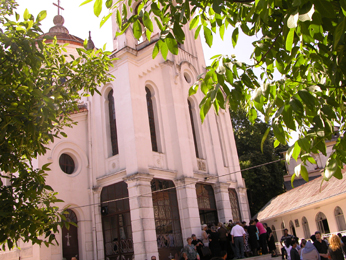Divin Liturgy in Strumica ( 24.05.2009 )
Sunday of the Blind Man
So they again called the man who was blind, and said to him, “Give God the glory! We know that this Man is a sinner.” He answered and said, “Whether He is a sinner or not, I do not know. One thing I know: that though I was blind, now I see.” Then they said to him again, “What did He do to you? How did He open your eyes?” He answered them, “I told you already, and you did not listen. Why do you want to hear it again? Do you also want to become His disciples?” Then they reviled him and said, “You are His disciple, but we are Moses’ disciples. We know that God spoke to Moses; as for this fellow, we do not know where He is from.” The man answered and said to them, “Why, this is a marvelous thing, that you do not know where He is from; yet He has opened my eyes! Now we know that God does not hear sinners; but if anyone is a worshiper of God and does His will, He hears him. Since the world began it has been unheard of that anyone opened the eyes of one who was born blind. If this Man were not from God, He could do nothing.” They answered and said to him, “You were completely born in sins, and are you teaching us?” And they cast him out.
Jesus heard that they had cast him out; and when He had found him, He said to him, “Do you believe in the Son of God?” He answered and said, “Who is He, Lord, that I may believe in Him?” And Jesus said to him, “You have both seen Him and it is He who is talking with you.” Then he said, “Lord, I believe!” And he worshiped Him (John 9:24-38).
Two meetings took place between the man and Christ: the first one while he was still blind and while he carried his Cross with gratitude and humility; and the second, when he had already received sight and after he had justified Christ before the Pharisees. The Pharisees, too, met the man twice: once when they did not believe he had been blind and the other time when they wanted to disdain Christ’s work and Christ Himself. And while the Pharisees fell from one sin to another because they wronged the man first and then the Lord Himself, at the same time the man advanced from power to power, being illumined first and then perfected.
This Gospel reading describes yet another classical example, among many in the New testament, of the clash between them who stick to the word of the Law, which kills, and them who revere the Spirit of the Law, Who revives; between them who oppose with empty words all that does not suit their self-love and them who oppose empty words by deeds; between them who use personal disqualifications and them who are persons; between them who only take care of their outward appearance and them who first of all take care of their internal life; between them who stay self-sufficiently in the darkness of their mind and them who permanently illumine theirs; between them who hide themselves behind the authority of the institution and them who are bearers of the charisma, of the gift of the Holy Spirit.
Look how empty words and personal disqualifications are powerless against good deeds: “Give God the glory! We know that this Man is a sinner.” He answered and said, “Whether He is a sinner or not, I do not know. One thing I know: that though I was blind, now I see.” And how should they respond to the checked and confirmed fact that the man was blind and now he sees? What human wisdom could they come up with to oppose this fact, known to everyone? What words could they use to oppose any deed pleasing to God, let alone God’s personal deed…?
Still, is what follows after that repentance or yet another failure? The Pharisees are trying to find out the recipe for the success, as if it were some secret knowledge that can be easily attained and learnt only with the reason, as if it were some independent impersonal power, as if it were something for sale: “What did He do to you? How did He open your eyes?” if I did not know that the man—that is, the Lord through the man, with the best intention is reminding them of the growth in the personal relationship as the road to that power, I would get the idea that the man is joking with them: “I told you already, and you did not listen. Why do you want to hear it again? Do you also want to become His disciples?”
Still, is what follows after that repentance of the Pharisees or yet another failure? Here is how people without authority hide behind the authority of the institution they represent, with which they obviously have nothing in common: “You are His disciple, but we are Moses’ disciples. We know that God spoke to Moses; as for this fellow, we do not know where He is from.” If I did not know that the man—that is, the Lord through the man, with the best intention is reminding them of the spiritual law of obedience, I would again get the idea that the man is joking with them: “Why, this is a marvelous thing, that you do not know where He is from; yet He has opened my eyes! Now we know that God does not hear sinners; but if anyone is a worshiper of God and does His will, He hears him. Since the world began it has been unheard of that anyone opened the eyes of one who was born blind. If this Man were not from God, He could do nothing.” When we see that something in our life is not going as we thought it would, let us not blame others for that instead of ourselves; it is certainly because we do not listen to our Heavenly father and do His will.
Still, is what follows after that, too, repentance of the Pharisees or yet another failure? Make it out yourselves: “You were completely born in sins, and are you teaching us?” and, as the Gospel reads further on, they cast him out. It is a testimony to powerlessness, inability to repent.
Yet, when the Pharisees repudiate you, do not be afraid but rejoice in that, it is only a testimony that Christ Himself has found you and embraced you and that Christ Himself is leading you and bringing you into all Truth. Jesus heard that they had cast him out; and when He had found him, He said to him, “Do you believe in the Son of God?” He answered and said, “Who is He, Lord, that I may believe in Him?” And Jesus said to him, “You have both seen Him and it is He who is talking with you.” Then he said, “Lord, I believe!” And he worshiped Him. And when the Godman Jesus Christ leads us, then the bodily ascesis changes into ascetical love for the enemies, and even martyrdom for His sake; then the prayer of the intellect changes into mind-and-heart prayer, and even into unceasing one; then the beholding of the first light changes into illumination, and even into uncreated Divine light; then faith changes into knowledge, and even into foreknowledge.
Metropolitan Nahum of Strumica
